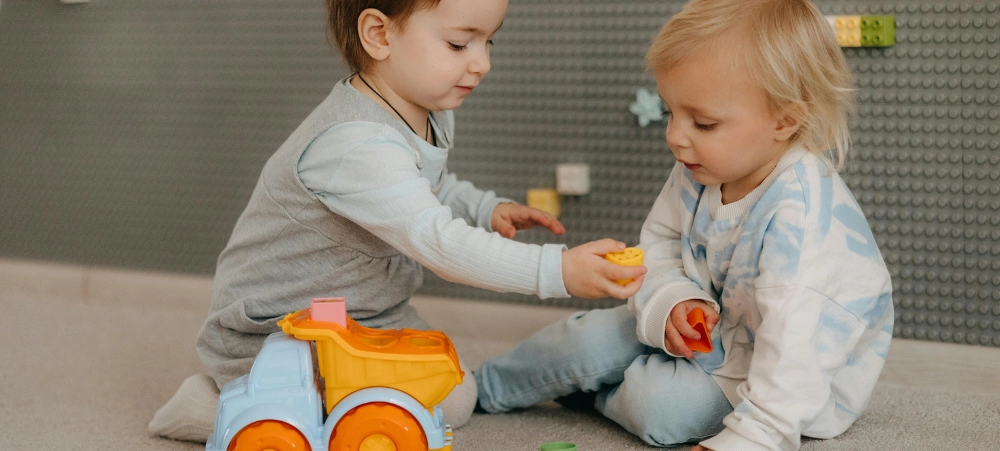Sharing is a cornerstone of social interaction, but for toddlers, it’s not an instinctive behaviour. Toddlers are naturally focused on their own needs and desires, making the concept of sharing challenging to grasp. However, with patience, practice, and consistent guidance, you can help your little one develop the social skill of sharing. Here’s a practical guide to teaching your toddler to share.
Why Sharing Is Difficult for Toddlers
Understanding why toddlers struggle with sharing can help you approach the task with empathy:
- Developmental Stage: Toddlers are in the “me” phase of development, where they’re learning autonomy and exploring ownership.
- Limited Impulse Control: Their brains are still developing the ability to manage emotions and delay gratification.
- Emotional Attachment to Objects: Toys and belongings can feel like extensions of themselves, making it hard to let go.
Knowing this, it’s important to approach sharing as a skill to be learned over time rather than a behaviour to be enforced immediately.
1. Set the Stage for Success
Create an environment where your toddler can learn sharing gradually:
- Model Sharing Behaviour: Show your toddler what sharing looks like by sharing items with them (e.g., “Here’s a piece of my apple. Would you like some?”).
- Use Small Group Play: Arrange playdates with one or two other children rather than overwhelming your toddler with large groups.
- Provide Plenty of Toys: Having multiples of the same toy can reduce conflict and make it easier for toddlers to practice taking turns.
2. Practice Turn-Taking
Turn-taking is a stepping stone to sharing and is easier for toddlers to understand:
- Explain the Process: Use simple language, such as “It’s your turn to play with the car, and then it will be Sam’s turn.”
- Set Timers: Use a timer to signal when it’s time to switch turns. This creates a clear structure and helps manage expectations.
- Cheer Them On: Celebrate when they successfully wait for their turn, reinforcing positive behaviour.
3. Use Positive Reinforcement
Praising your toddler for sharing reinforces the behaviour:
- Be Specific: Instead of saying, “Good job,” say, “You did a great job sharing your blocks with Mia!”
- Acknowledge Effort: Even if it’s a small step, such as letting another child hold a toy for a moment, offer encouragement.
4. Teach Empathy
Helping your toddler understand others’ feelings can make sharing more meaningful:
- Talk About Emotions: Use phrases like, “Look, Jack is sad because he wanted a turn with the ball. Let’s share so he can be happy.”
- Read Books About Sharing: Stories with relatable characters can illustrate the benefits of sharing and how it builds friendships.
- Play Pretend: Use role-playing with toys to demonstrate how sharing can make playtime more fun for everyone.
5. Address Conflict Calmly
When disputes over toys arise, stay calm and guide your toddler through the situation:
- Don’t Force It: Forcing a child to share can backfire, leading to resentment. Instead, encourage compromise and turn-taking.
- Describe the Problem: Say, “Both of you want the truck. Let’s find a solution so you can both play.”
- Offer Alternatives: Suggest a different toy or activity while waiting for a turn.
6. Give Them Ownership
Respect your toddler’s attachment to certain items and allow them to decide on some boundaries:
- Special Toys: Let your toddler choose one or two “special” toys they don’t have to share during playdates.
- Practice Sharing with Other Toys: Explain that while their special toys are just for them, the other toys can be shared with friends.
7. Be Patient and Consistent
Teaching a toddler to share takes time and repeated effort. Celebrate small victories, remain consistent with your approach, and understand that setbacks are normal. Over time, your child will begin to grasp the concept of sharing and apply it more willingly.
8. Celebrate the Benefits of Sharing
Help your toddler see the positive outcomes of sharing:
- Making Friends: Highlight how sharing can lead to making and keeping friends.
- More Fun Together: Show them how shared activities, like building blocks or playing pretend, can be more enjoyable when everyone participates.
When to Seek Additional Support
If your toddler continues to struggle significantly with sharing, even after consistent practice, consider discussing it with your paediatrician or a child development specialist. They can provide tailored strategies to address your child’s unique needs.
Final Thoughts
Teaching your toddler to share is a process that requires patience, understanding, and lots of practice. By modelling sharing, reinforcing positive behaviour, and helping your toddler navigate their emotions, you’re equipping them with an essential social skill that will benefit them for years to come. Remember, every small step toward sharing is a big leap in your toddler’s social development.
We understand that there are many aspects that encompass a Mother, Father or Child and strive toward providing resources and services that accommodates this.
Our content is aimed to inform and educate families on issues starting from pregnancy through to the challenges of the teen-age years.
- Say Hello to the Ultimate Holiday Brunch Bite - December 17, 2025
- Tiny Toons Looniversity Returns: Meet the Voice Behind Plucky and Hamton! - December 12, 2025
- From Pain to Possibility: Panado®’s New Marketing Campaign, Highlights The Joy Of Pain Relief - December 10, 2025





